It Was Like a Fairy Tale Come True
SUMMARY: ...except the magic was the power of space flight and each hero's success was in coming back alive.
When I was born, no manmade object--let alone a human--had ever gone up into space. It wasn't until I was nearly two that the first satellite, Russia's Sputnik, woke the world to the realization that we had crossed a threshold: Before, we were a species locked to the ground, to a single planet, with the universe beyond our thin layer of atmosphere forbidden to us. And then, now, we stepped into a reality in which Infinity and Beyond were suddenly within our reach.
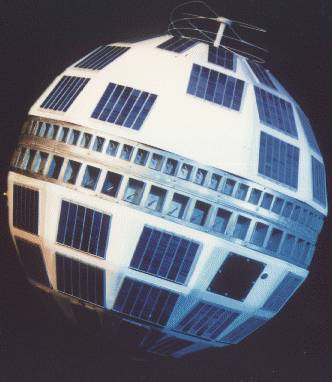 (Telstar was about the size of one of those inflatable exercise balls--34 inches across. Wikipedia photo source.)
(Telstar was about the size of one of those inflatable exercise balls--34 inches across. Wikipedia photo source.)My first recollections of our conquest of The Darkness Beyond were twofold: First, standing in the darkened driveway of our apartment complex with my parents and the neighbors, standing, eager, waiting, eyes heavenward, straining to see the tiny speck of light of Telstar on its scheduled pass across the heavens. I was six, and I knew from the excitement around me that something magical had happened.
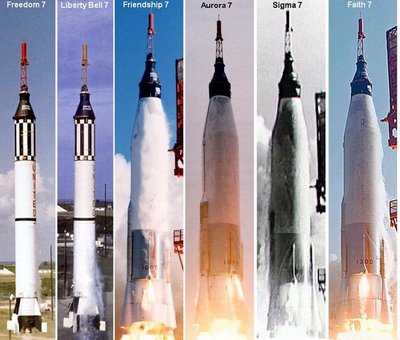 (Wikipedia photo source.)
(Wikipedia photo source.)And, second, we knew all about the Mercury capsules, tiny tin cans barely big enough for a human, barely popping into space and dropping back to the sea, whence they were plucked by helicopter from the waters and deposited on the deck of a military vessel nearby. These were always suspenseful--would they burn up on reentry? Would they find that tiny speck in the ocean? The first American into space reached that goal for a mere 15 minutes the year I turned 5. Nine months later, the first American ever--and almost the first human ever--orbited Earth...a mere 3 times over a four-hour period. We must have seen these on TV (we had a TV in our house by then), because when my parents gifted me with a tiny plastic Mercury space capsule and bright orange helicopter with a skyhook dangling from a string, I knew all about how they were used. I loved that toy.
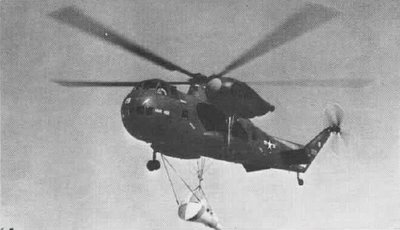 (Wikimedia image source.)
(Wikimedia image source.) This was my world as a child: Space travel was a miracle and our first steps into space were tiny, halting, fragile, risky things.
We watched every rocket launch on TV--and every one played out on TV for hours, broadcast live. We watched the countdown-- "T minus two hours and counting" said the man in the background--and sometimes you could see activity on the ground or watch the astronaut (with Gemini, two astronauts; with Apollo, finally, three) make his way into the tiny capsule. "T minus 10 seconds...9...8...7..." and I'd feel my heart rise with the rocket as it ponderously rose, ever so slowly, amazingly slowly for the tremendous power and fury of the fires and smoke erupting from its base, finally, magically, into the air, and the cameras watched it, the light of its rocket flickering, flickering, growing ever smaller, until it was out of sight.
A miracle. Every flight had simulations broadcast so that you could see what the rocket stages were doing as they separated, how the capsule maneuvered in space. And then, always at the end, that terrifying, burning, racing plunge into the sea, with no control; they dropped from orbit and fell, a flaming stone, through the atmosphere to the water below.
Forty years ago today--I was thirteen--men walked on the moon. Everyone talked about it. Everyone watched the broadcasts coming back live--Live!--from another planet. Astounding, just...astounding. The solar system now seemed within our reach, it felt like there was nowhere we couldn't go, places we couldn't explore, resources we couldn't find: Now--we could do it all! And yet, for all that we could land on the moon under control, and leave its surface again, back home to Earth and there was still that uncontrolled plummet to the vast, cold sea.
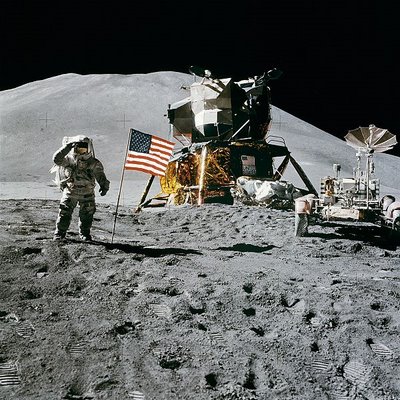 (Wikipedia image source.)
(Wikipedia image source.)I was fully an adult--out of college, married, owned my first home and then my second, before that changed. We watched the launch of the first space shuttle on TV, all of us, waiting to see whether it would even fly. And then, two days later, the suspenseful time as it descended from orbit back through the atmosphere and those dreadful minutes of silence where communication was impossible--
And, by all the Gods, it came through! We might have cheered when we heard the astronaut's voices as radio contact was reestablished. And then we waited with bated breath, begging silently, fists clenched, waiting to see whether it was possible for it to actually land again, under control, on the ground, safely and predictably. Then Lo!, it did! And I cried from the joy of it.
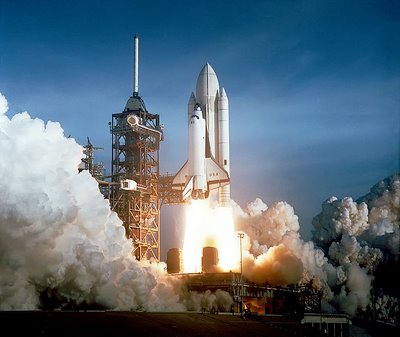 (Wikipedia photo source)
(Wikipedia photo source)Not long after that, as we who remembered how it had been sat around the TV for yet another blast-off, still as astounding as it had always been, my youngest sister (9 years younger), wandered into the living room, said, "Oh, another rocket launch," and wandered out again. And that was the first I truly realized that the magic of it all was lost to those who hadn't grown up with it, for whom space flight was a matter of fact, shuttles landing under a pilot's control an everyday occurrence.
I hope that, within my lifetime, we will find the magic again and find our way out to our moon, our neighboring planets, and their moons. Because it seems so sad that we should be imprisoned here, on a single planet, our little castle with nowhere to go if it should burn, when we have had the magic in our hands and shown that we could use it. I hope.
Labels: foot grabbing, goals, lifestyle, what it's all about
Complete list of labels

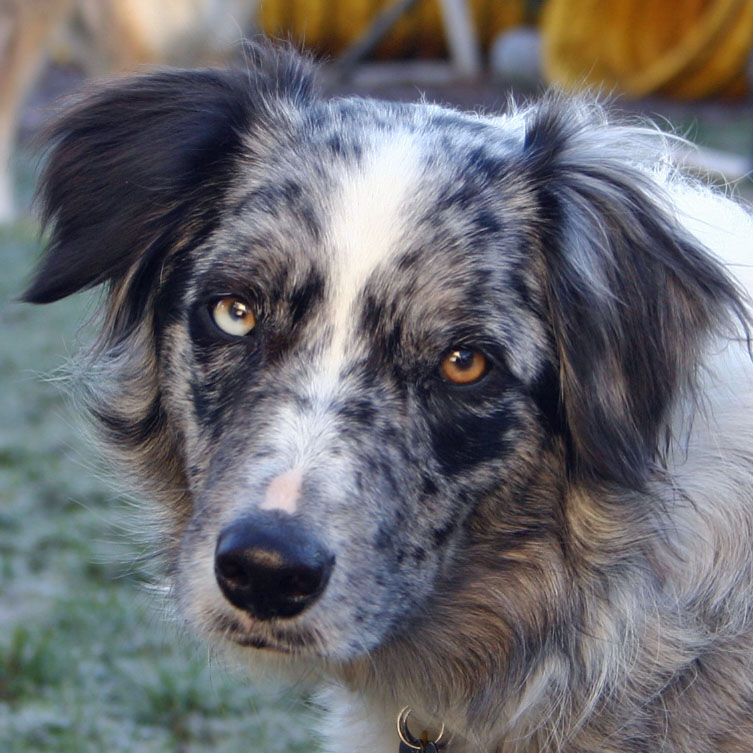



2 Comments:
Thanks for the flashbacks! Add a year or so to your ages and you are telling of my experience (tho I never got any space-age toys from the parentals :-).
All through the 6th grade I commandeered one of the bulletin boards in my classroom to track the space program in the news.
Wow--Now *that's* geeky. ;-)
Post a Comment
Links to this post:
Create a Link
<< Home